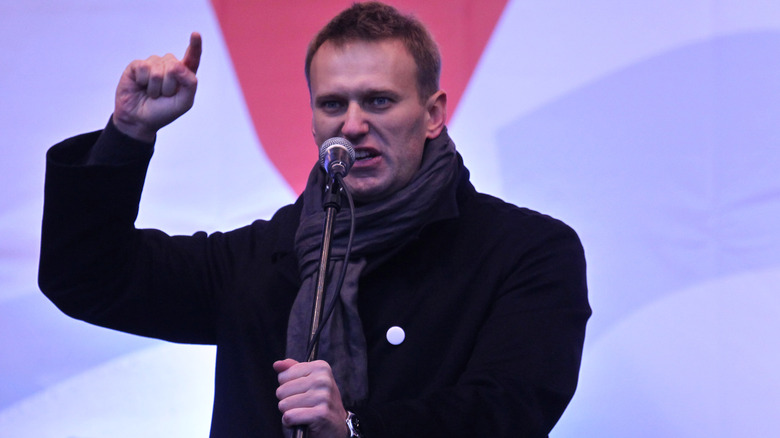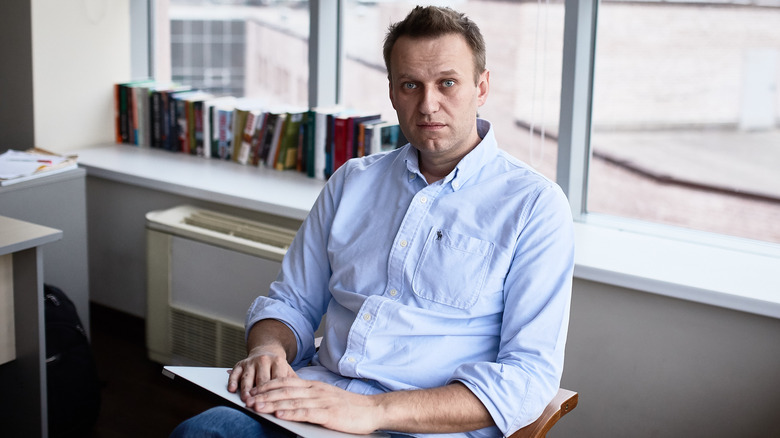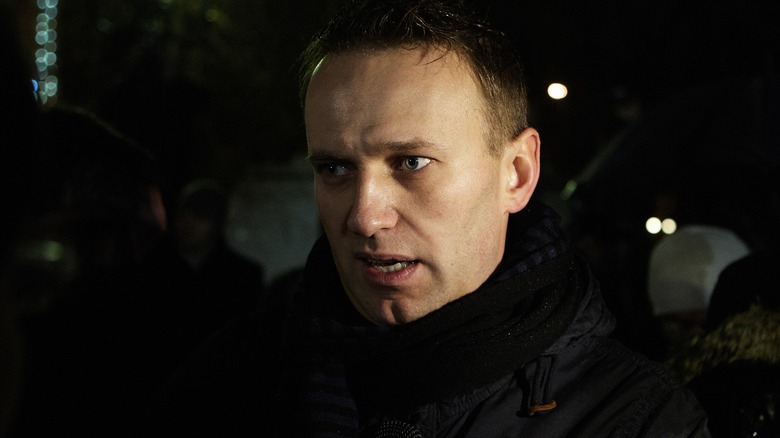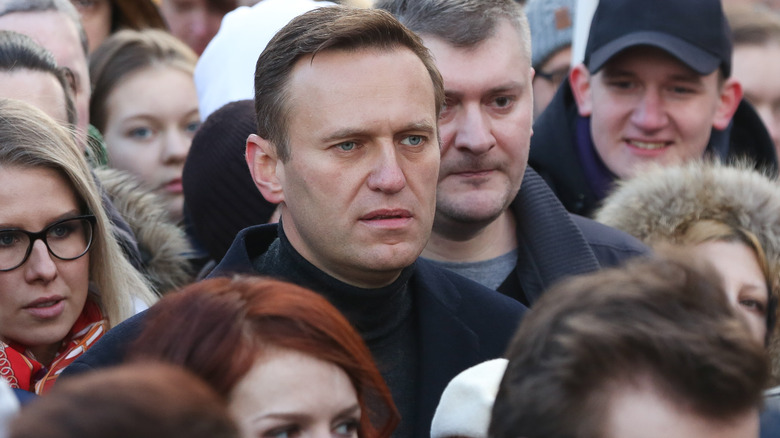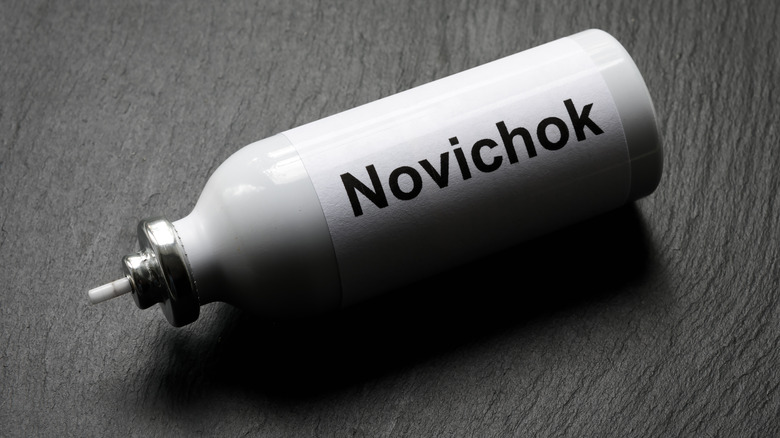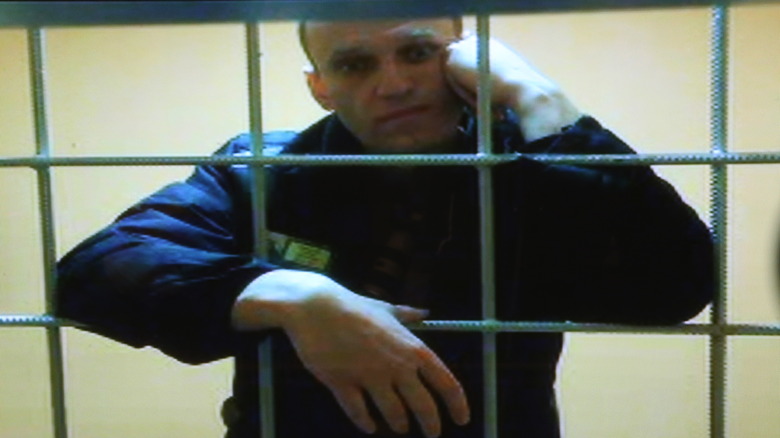The Untold Truth Of Kremlin Critic Alexei Navalny
In Vladimir Putin's Russia, what might be called the official or systemic opposition isn't truly opposed to the government. With the pro-Putin United Russia having been in the majority of the state Duma since 2007, and with the ruling party both taking action against opposition parties and co-opting their leadership to diffuse strife, there's long been a dearth of opportunity and will for anti-Putin forces to do much within the political system. Opportunities for the nonsystemic opposition to organize are similarly restrained, but actors outside of politics have done more to rally local and international support for the fight against Putin.
Among the most prominent of the Russian dictator's critics was Alexei Navalny, who died under mysterious circumstances in an Arctic prison in February 2024 (per Reuters). Navalny was tenacious, charismatic, and courageous, traits that made him a stirring figure to anti-Putin forces even as they put him repeatedly in harm's way. The years leading up to his death saw him face legal harassment, arrest, poisoning, and jail sentences — a remarkable targeted campaign against a lawyer and blogger who, per The Washington Post, Vladimir Putin refused to name aloud.
Throughout the campaign against him, Navalny continued to rail against Putin and against corruption in Russian politics. His opposition to a brutal dictator, one often positioned as the great antagonist of the West, could lead to Navalny's own shortcomings being papered over. But many couldn't help but admire his persistence, and his death has been described as a terrible blow for the Russian opposition.
Navalny saw Putin consolidate power as a student
Alexei Navalny was born on June 4, 1976, in Butyn, a small town outside of Moscow, to an economist mother and a military officer father. His upbringing included frequent travel among various garrison towns and summers with his grandmother outside Chernobyl; Navalny's family was among those evacuated after the 1986 nuclear disaster. On their way out, the family beheld the enforced attempted cover-up by Soviet officials.
Navalny obtained two degrees. His first came from the People's Friendship University of Russia, where he studied law, and the second from the Finance Academy under the Government of the Russian Federation, where he studied finance. It was as a student that Navalny first came into contact with systemic opposition to Vladimir Putin. He joined Yabloko, otherwise known as the Russian United Democratic Party. The pro-democracy, pro-free market party was a major player in Russian politics in the 1990s, but by the time Navalny joined up, pro-Putin forces had united into an effective bloc, and Putin himself had swayed many of Yabloko's former supporters.
He came to prominence as an anti-corruption campaigner
In 2004, according to Alexei Navalny's campaign website, he founded the Muscovite Protection Committee, a collection of groups opposed to infill development projects in Moscow, and was Navalny's first action against the status quo of Russian society listed on the website's timeline. The committee claimed credit for foiling several harmful construction projects. But another effort of Navalny's four years later would see him make the national radar.
Starting in 2008, Navalny began drawing attention to corruption in state-owned corporations. It was a safer way to target the political elite in Russia than a direct attack; many of the company leaders were tied to Vladimir Putin. Navalny bought up shares to gain access to shareholder meetings and brought up financial irregularities and opaque reporting. He also formed another group, the Union of Minority Shareholders, and took several companies to court on the Union's behalf.
Navalny's anti-corruption drumbeat was so loud and reached so many Russians that the government was forced to recognize the problem at a scale of $31 billion in embezzled funds. Two years later, Navalny followed up this campaign with a blog, RosPil, dedicated to outing corruption in Russian business and government. RosPil also gave the opposition movement a rallying cry in 2011; he labeled the pro-Putin United Russia "a party of crooks and thieves."
Navalny's own politics were controversial
The 2011 parliamentary elections in Russia were decried within and without its borders for irregularities and alleged fraud. Public outrage ran hot enough to spark widespread protests, and Alexei Navalny earned one of his arrests when he took to the streets with his fellow Russians. He became more outspoken about politics after the election and even ran a 2013 campaign for mayor of Moscow that took Russian authorities by surprise when he finished with 27% of the vote. But Navalny's own politics were a source of controversy throughout his life, and the controversy cost him support and frustrated unity among opposition forces in Russia.
Navalny was an avowed nationalist, and his comments in favor of ethnic Russians and against immigration and subsidies for minority republics alarmed many. Yabloko expelled him from the party in 2007 over his rhetoric, and 14 years later, party officials denounced him as "disastrous and dangerous for Russia" to Open Democracy. Others accused him of racism, and there was a history of ethnic slurs in his writing. Navalny also supported Russian aggression against the country of Georgia in 2008.
Some of these critiques were bolstered by state efforts. While Navalny walked back some of his rhetoric later in life, he did not disavow his controversial positions. And as Russian observers told Euro News, the expectation among some in the West that he represented an unblemished campaigner for liberal democracy, and that the movement around him was naturally sympathetic to the West, were both mistaken.
He was poisoned in an attack blamed on Putin
After his run for mayor, Alexei Navalny continued to speak out against Vladimir Putin and Russian corruption. He faced trials and suspended prison sentences, put out an anticorruption documentary, and made a failed attempt at the Russian presidency. Officially, Putin and his allies treated Navalny as a marginal figure, unworthy of even being referred to by name.
But the government's professed indifference was hard to square with the events of August 20, 2020. On that day, Navalny was boarding a flight from Siberia to Moscow when he started to feel sick. Per the BBC, he was in excruciating pain and screaming, leading to an emergency landing in Omsk. Medics attempted to give him first aid but realized his immediate needs were far beyond the care they could provide. Doctors also started to suspect his illness was caused by poisoning, and eventually under scrutiny, the hospital had to release him to be airlifted to Germany for care.
It was determined that Navalny was poisoned with the nerve agent novichok, which can cause symptoms like paralysis, seizures, and death. The Kremlin was blamed for the poisoning, a claim they fervently denied. In January 2021, Navalny returned to Russia and was immediately detained, sparking massive protests in Russia for his release.
Navalny defied prosecution form prison
On February 2, 2021, not long after his return from Germany, a Russian court sentenced Alexei Navalny to a two-and-a-half-year prison sentence. According to CNN, the sentencing was a continuation of a previous delayed sentence from 2014; the trip to Germany was held to be in violation of probation. The judge presiding over the case imposed the new sentence, which Navalny was required to complete while incarcerated.
His lawyers said that Navalny took the news "bravely," and he gave every impression of wanting to fight on for the next few years. He kept up commentary on Russian politics through social media and staged a weeks-long hunger strike soon after being incarcerated. Unlike the action against Georgia in 2008, Navalny opposed the 2022 invasion of Ukraine. He even cracked jokes when appearing in court via video stream. But as he continued to speak out, the Russian state continued to target him. He received additional sentences, one for nine years and another for 19, which he accepted as "a life sentence," he said, "which is measured by the length of my life or the length of life of this regime" (via ABC News). Groups allied with him faced political opposition and a shut-out from any levers of power.
Navalny's lawyers lost contact with him at the end of 2023. He was eventually traced to an Arctic penal colony, where he claimed he was subjected to pro-Putin music (per Reuters). But he was still outspoken and appeared healthy, making his death at 47 appear even more suspicious.
